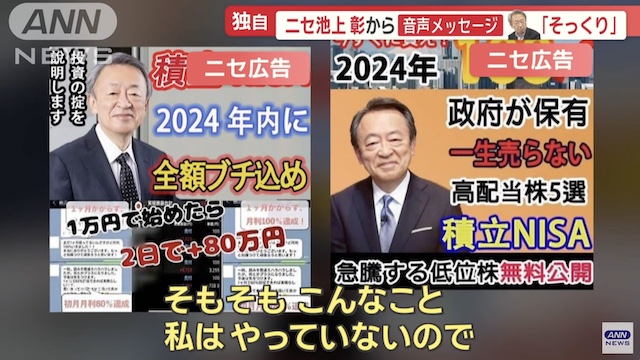TOKYO, May 17 (News On Japan) - Japan's National Police Agency revealed on May 16 that the amount of money lost to impersonation investment scams on social media totaled 21.9 billion yen in just three months from January to March this year.

In April, a 70-year-old woman in Ibaraki Prefecture was swindled out of approximately 800 million yen, and in early May, a man in his 70s in Hyogo Prefecture was scammed out of 660 million yen, indicating that the amounts involved in these scams are increasing.
On May 15, the Liberal Democratic Party's working team on social media impersonation measures discussed Meta, the company that operates Facebook. Former Digital Minister Takuya Hirai commented on Meta's response to the LDP's request for improvements: 'Frankly, there were a lot of things that made me think, "You can do it if you try," which made it clear they hadn't been doing them, and that makes me angry.'
Meta is reportedly willing to comply with the LDP's request to send a representative to the Diet as a witness, although CEO Mark Zuckerberg declined to attend.
Entrepreneur Yusaku Maezawa has filed a lawsuit seeking damages from Meta.
Maezawa said: 'Today, I filed a lawsuit against both Meta and Facebook Japan.'
He is suing for just one yen. Why?
From Maezawa's official X: 'I want to clarify whether their actions are illegal or legal.'
He is demanding disclosure of Meta's specific measures against fraudulent ads and the questioning of responsible parties.
From Maezawa's official X: 'If we don't hold accountable those who generate fake content and misuse it, as well as the platforms that display such content, society will be in trouble.'
Listening Closely Reveals 'Inconsistencies'... Akira Ikegami Confirms 'Fake Voice'
Fake ads featuring celebrities are becoming more sophisticated. Akira Ikegami, who had his image used without permission, said: 'They used crude language... it's really inappropriate.'
Ikegami is concerned that more people might trust 'fake ads' because of voice messages: 'If a voice message suddenly arrives, people might think, "Oh, it's from the real person!" That's scary. We need social measures to put some brakes on this.'
As impersonation techniques become more sophisticated, Ikegami sounds the alarm: 'I haven't done any of this in the first place. If people understand that, they won't be swayed by calls for investments, etc.'
AI Misuse... Comparing 'Fake Akira Ikegami' Voices
As fraudulent techniques become more sophisticated, the police are wary of the possibility that AI is being misused in these crimes.
A specialist familiar with AI was asked to listen to the voice message sent from the 'fake Akira Ikegami.'
Yoshikazu Nishimura, Chief of Orutsu Co., Ltd., said: 'If you receive a message under the preconception that it's from Akira Ikegami, and see a photo or video, you might believe, "This is Akira Ikegami."'
However, the sent voice was made using conventional voice synthesis technology.
Nishimura said: 'Frankly, it's immediately apparent that it's not a human speaking, but a machine.'
Using AI technology, Ikegami's voice was created.
AI-generated voice: 'Please don't be fooled. I never solicit investments.'
Compared to the voice sent by the 'fake Akira Ikegami,' the AI-generated voice sounded more natural and sophisticated. It was compared with Ikegami's actual comment broadcasted last month.
Nishimura said: 'It doesn't take one or two weeks; technically, it can be done in less than ten minutes.'
Scam Ads... Deceptive Tactics
Cases of deception using not only images and text but also voice are increasing. One victim, known as XX, fell prey to a scam ad on social media.
XX (in their 60s) said: 'I’ve been trading stocks and wanted to make a bit more profit.'
XX accessed a fake ad on Facebook featuring a renowned economist's image. They were invited to a LINE group called a 'stock study group.'
Later, XX received individual investment advice via LINE from a woman claiming to be a mentor. However, she recommended not stocks but cryptocurrency.
Over about two months, XX exchanged daily trivial conversations with the mentor. XX ended up completely trusting the mentor.
XX said: '(Q. How much money did you invest?) 20 million yen. She said, "I’ll manage it and increase the profit."'
Following the mentor's instructions, XX invested 20 million yen in cryptocurrency. When told that profits had been made and tried to withdraw the money, XX was asked for an additional 5 million yen withdrawal fee, which made them realize it was a scam.
Reviewing the communication with the scammer revealed some 'inconsistencies.'
Communication with the mentor 'Please pay with confidence.'
'Both safety and risk are highly guaranteed!'
'We only need to spend a little time.'
'We have great improvements!'
The mentor used some nonsensical phrases. There were other inconsistencies as well.
Communication with the mentor 'Can you only prepare 10 million yen? Can’t you prepare more?'
XX said 'It might take some time.'
The mentor replied 'Don’t worry, be patient.'
The messages, which had been in formal language, suddenly switched to a friendly tone. Additionally, broken Japanese voice messages were also sent.
Mentor's voice message 'Today too, good job. Rest well. I will sleep now too. Good night.'
XX said: 'Looking back now, does it seem suspicious to others?'
The variety of tactics used in social media investment scams continues to increase. Meta, which continues to display fake ads, stated: 'We have devoted substantial resources to combating scam ads and will continue to make significant investments in expanding detection technology.'
Source: ANN















